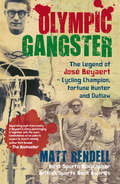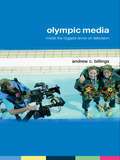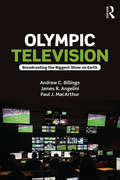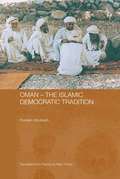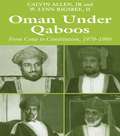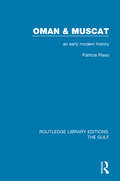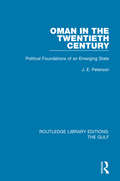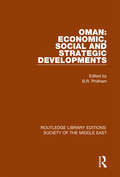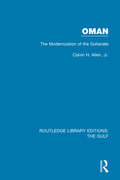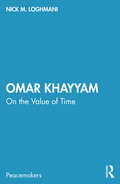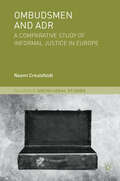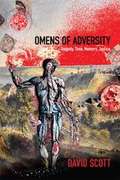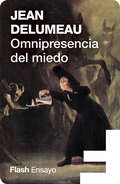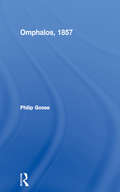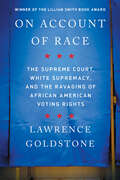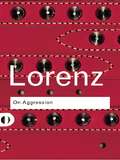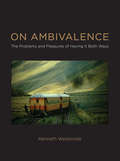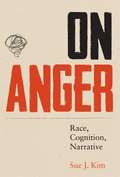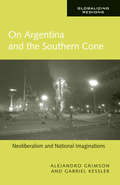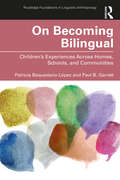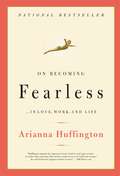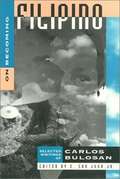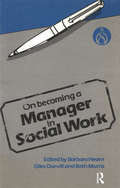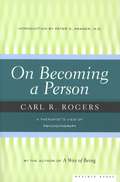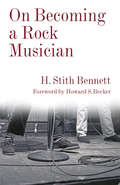- Table View
- List View
Olympic Gangster: The Legend of José Beyaert - Cycling Champion, Fortune Hunter and Outlaw
by Matt RendellRestlessly vital and possessed of great physical strength, José Beyaert lived many lives. During the Second World War, he boxed and trafficked arms for the Resistance on his bicycle. After it, he became an international cyclist. In 1948, a mile from the end of the Olympic road race around Windsor Park, he broke away alone to take the gold medal and started an adventure that would last the rest of his life. A Tour de France rider in the sport's golden age, José was invited to open a new velodrome in Colombia, South America. He travelled, intending to stay a month. Instead, driven by his thirst for adventure, he stayed for fifty years, becoming by turns athlete, coach, businessman, emerald-trader, logger, smuggler, perhaps even hired killer. Matt Rendell, who knew José Beyaert and met many of his family, friends and associates, tells the fascinating story of an almost-forgotten sporting hero who, incapable of living by other people's rules, lived his many lives on his own terms.
Olympic Media: Inside the Biggest Show on Television (Routledge Critical Studies in Sport)
by Andrew C BillingsLocated in the United States, NBC (National Broadcasting Company) is the biggest and most powerful Olympic network in the world, having won the rights to televise both the Summer and the Winter Olympic Games. By way of attracting more viewers of both sexes and all ages and ethnicities than any other sporting event, and through the production of breathtaking spectacles and absorbing stories, NBC’s Olympic telecasts have huge power and potential to shape viewer perceptions. Billings’s unique text examines the production, content, and potential effects of NBC’s Olympic telecasts. Interviews with key NBC Olympic producers and sportscasters (including NBC Universal Sports and Olympics President Dick Ebersol and primetime anchor Bob Costas) outline the inner workings of the NBC Olympic machine; content analyses from ten years of Olympic telecasts (1996-2006) examine the portrayal of nationality, gender, and ethnicity within NBC’s telecast; and survey analyses interrogate the extent to which NBC’s storytelling process affects viewer beliefs about identity issues. This mixed-method approach offers valuable insights into what Billings portrays as "the biggest show on television".
Olympic Television: Broadcasting the Biggest Show on Earth
by Andrew C. Billings James R. Angelini Paul J. MacArthurAs the Olympic spectacle grows, broadcast coverage becomes bigger, more complex, and more sophisticated. Part sporting event, part reality show, and part global festival, the Olympics can be seen as both intensely nationalistic and a celebration of a shared sense of international community. This book sheds new light on how the Olympic experience has been shaped by television and expanded across multiple platforms and formats. Combining a multitude of approaches ranging from interviews to content analyses to audience surveys, the book explores the production, influence, and significance of Olympic media in contemporary society. Built on a central case study of NBC’s coverage of the Rio Games in 2016, which is then placed within 20 years of content analyses, the book focuses on the entire Olympic television process from production to content to effects. Touching on key themes such as race, gender, history, consumerism, identity, nationalism, and storytelling, Olympic Television: Broadcasting the Biggest Show on Earth is fascinating reading for any student or scholar with an interest in sport, media, and the global impact of mega-events.
Oman - The Islamic Democratic Tradition (Durham Modern Middle East and Islamic World Series #Vol. 8)
by Hussein GhubashOman is the inheritor of a unique political tradition, the imama (imamate), and has a special place in the Arab Islamic world. From the eighth century and for more than a thousand years, the story of Oman was essentially a story of an original, minority, movement: the Ibadi. This long period was marked by the search for a just imama through the Ibadi model of the Islamic State. Hussein Ghubash’s well-researched book takes the reader on an historical voyage through geography, politics, and culture of the region, from the sixteenth century to the present day. Oman has long-standing ties with East Africa as well as Europe; the first contact between Oman and European imperialist powers took place at the dawn of the 1500s with the arrival of the Portuguese, eventually followed by the Dutch, French and British. Persuasive, thorough and drawing on Western as well as Islamic political theory, this book analyzes the different historical and geopolitical roles of this strategic country. Thanks to its millennial tradition, Oman enjoys a solid national culture and a stable socio-political situation. Today, it is moving steadily towards a democratic future.
Oman Under Qaboos: From Coup to Constitution, 1970-1996
by Calvin H. Allen W. Lynn Rigsbee IIThis is an examination of the political, economic and social development of Oman from the accession Sultan Qaboos in a palace coup in 1970 to the promulation of the basic law of 1996. The book argues that the sultanate does not follow the "rentier" model but the patriarchal tradition.
Oman and Muscat: An Early Modern History (Routledge Library Editions: The Gulf #12)
by Patricia RissoDuring the early modern period Oman held a key position in the trade routes whereby the Muslim world dominated indigenous trade in the Indian Ocean. In the second half of the eighteenth century, Oman broke free from foreign political control and became the dominant economic and naval force in the western Indian Ocean and the Gulf. This was a golden age for Omanis, when their economic power and political prestige were at their height. This study, first published in 1986, presents a detailed, comprehensive history of this important period, and includes tribal politics, the role of religion, and Oman’s relations with neighbouring areas such as Persia and East Africa. The era ends with the political and maritime pressures exerted on Oman by Britain and France, and the territorial pressures exerted by the Wahhabi Arabians.
Oman in the Twentieth Century: Political Foundations of an Emerging State (Routledge Library Editions: The Gulf #13)
by J.E. PetersonOman was ruled by the Al Bu Sa’id for 250 years, and during this period the fortunes of the state varied considerably. But in July 1970, as a result of a palace coup, the state abruptly turned away from isolation and traditions of the past. The most obvious alteration was in the dramatic change in the outward appearance of the country, particularly as exemplified by the rejection of the long era of stagnation and the parallel emphasis on socio-economic development. In the political realm, however, the shifting balance of power and the rapid growth and diversification of the state’s administrative structure were based essentially on perennial themes in Omani politics. The interplay between four of these themes forms the basis of this study, first published in 1978. The role of the Sultan and the ruling family, the development of the administration, the exercise of tribal politics and the impact of external influences on the state are closely examined and the modifications they went in response to the various challenges of the twentieth century are discussed. The constant flux in the relative importance of each of these themes illustrates the fragile nature of the traditional Omani political system, for in the twentieth century the Al Bu Sa’id Sultanate found its precarious hold over the country challenged on a number of occasions. These challenges – ranging from the tribal and religious rebellion of 1913-20, to the Marxist-Leninist revolt in Dhufar – are also analysed in detail, together with the response of the Sultanate to their impact.
Oman: Economic, Social and Strategic Developments (Routledge Library Editions: Society Of The Middle East Ser.)
by B. R. PridhamOman is an important country for the West, both as an oil exporter and as a key ally strategically placed at the entrance to the Gulf. This book, first published in 1987, provides an overview of post-war social, political and economic developments in the country. It outlines the historical and geographical background, considers economic developments both in the oil and non-oil sectors, as well as exploring societal changes in Omani culture and education.
Oman: The Modernization Of The Sultanate (Routledge Library Editions: The Gulf)
by Calvin H. Allen, JrUntil the 1970s Oman was an isolated, almost medieval kingdom, virtually unknown to the outside world. The 1970 palace coup that brought Sultan Qaboos b. Sa’id Al-Sa’id to power also brought Oman into the twentieth century. Development programmes made modernization a rapid process, and Oman’s location at the entrance to the Straits of Hormuz gave the country an increasing importance to US security interests in the Gulf region. Yet despite modernization, Oman remains an unknown land. This book, first published in 1987, dispels some of the mystery by focusing on the land, the people and the history. It explores the influences on events of trade, foreign involvement in Omani affairs, and Ibadism (the principal sect of Islam in Oman). It also emphasizes the role of the Sultan in contemporary Oman. The architect of Oman’s ‘new age’, Qaboos has overseen significant changes in the country’s political system and rapid economic growth financed by oil exports.
Omar Khayyam: On the Value of Time (Peacemakers)
by Nick M. LoghmaniThis book explores the life and work of Omar Khayyam as a provocateur of peace. While Khayyam is known for his poetry, he was foremost a prominent mathematician who looked at the world from a unique perspective. Using the transformative power of mathematics, he brought together seemingly irreconcilable concepts in his work. Through his art, philosophy, and mathematics, Khayyam sought to create harmony between what on the surface looks like a clash between his scientific view, romantic and often provocative poetry, and philosophy. The book sheds light on his spiritual and philosophical journey through a cross-sectional account of his poetry, philosophical view, and mathematics and science. It explores the complex inner life of a multidimensional scholar as he negotiated between faith and science, constructing a framework for peace by looking at the world as it presents itself to us, contemplating the temporality of life and enriching it with wisdom and joy. Historically and culturally informed, this book will be indispensable to readers of Omar Khayyam’s poetry and philosophy. It will also be of interest to students and researchers of peace and conflict studies, mathematics, science, Middle East literature, history, and popular culture.
Ombudsmen and ADR: A Comparative Study Of Informal Justice In Europe (Palgrave Socio-Legal Studies)
by Naomi CreutzfeldtHow do ordinary people experience and make sense of the informal justice system? Drawing on original data with British and German users of Ombudsmen— an important institution of informal justice, Naomi Creutzfeldt offers a nuanced comparative answer to this question. In so doing, she takes current debates on procedural justice and legal consciousness forward. This book explores consciousness around ‘alternatives’ to formal legality and asks how situated assumptions about law and fairness guide people's understandings of the informal justice system. Creutzfeldt shows that the everyday relationship that people have with the informal justice system is shaped by their experiences and expectations of the formal legal system and its agents. This book is an innovative theoretical and empirical statement about the future prospects for informal justice in Europe.
Omens of Adversity: Tragedy, Time, Memory, Justice
by David ScottOmens of Adversity is a profound critique of the experience of postcolonial, postsocialist temporality. The case study at its core is the demise of the Grenada Revolution (1979-1983), and the repercussions of its collapse. In the Anglophone Caribbean, the Grenada Revolution represented both the possibility of a break from colonial and neocolonial oppression, and hope for egalitarian change and social and political justice. The Revolution's collapse in 1983 was devastating to a revolutionary generation. In hindsight, its demise signaled the end of an era of revolutionary socialist possibility. Omens of Adversity is not a history of the Revolution or its fallout. Instead, by examining related texts and phenomena, David Scott engages with broader, enduring issues of political action and tragedy, generations and memory, liberalism and transitional justice, and the possibility of forgiveness. Ultimately, Scott argues that the palpable sense of the neoliberal present as time stalled, without hope for emancipatory futures, has had far-reaching effects on how we think about the nature of political action and justice.
Omnipresencia del miedo
by Jean DelumeauLa historia del miedo en Occidente. En este ensayo, Jean Delumeau (El miedo en Occidente, Taurus) explora los principales miedos que han marcado la civilización occidental desde la Antigüedad. A través de frases hechas, ritos y la literatura, el autor examina algunos de los terrores más recurrentes. El mar, por ejemplo, se convirtió en el lugar del miedo y en símbolo de locura. La cultura occidental ha estado siempre influida por el terror a lo lejano y a lo próximo, a lo nuevo y a lo viejo. En definitiva, a todo aquello que no se podía entender. «Antiguamente el miedo estaba en todas partes.»
Omphalos, 1857: An Attempt To Untie The Geological Knot
by Philip GosseGosse argued that fossils are not really the remains of creatures which existed. God had created the world in six days, but had made it look like it was already ancient, complete with the remains of non-existent pre-historic life. Gosse's work was popular with neither Christians nor evolutionists.
On Account of Race: The Supreme Court, White Supremacy, and the Ravaging of African American Voting Rights
by Lawrence GoldstoneAn award–winning constitutional law historian examines case–based evidence of the court's longstanding support for white supremacy (often under the guise of ""states rights"") to reveal how that bias has allowed the court to solidify its position as arguably the most powerful branch of the federal government.One promise of democracy is the right of every citizen to vote. And yet, from our founding, strong political forces were determined to limit that right. The Supreme Court, Alexander Hamilton wrote, would protect the weak against this very sort of tyranny. Still, as On Account of Race forcefully demonstrates, through the better part of American history the Court has instead been a protector of white rule. And complex threats against the right to vote persist even today.Beginning in 1876, the Supreme Court systematically dismantled both the equal protection guarantees of the Fourteenth Amendment and what seemed to be the right to vote in the Fifteenth. And so a half million African Americans across the South who had risked their lives and property to be allowed to cast ballots were stricken from voting rolls by white supremacists. This vacuum allowed for the rise of Jim Crow. None of this was done in the shadows—those determined to wrest the vote from black Americans could not have been more boastful in either intent or execution.On Account of Race tells the story of an American tragedy, the only occasion in United States history in which a group of citizens who had been granted the right to vote then had it stripped away. It is a warning that the right to vote is fragile and must be carefully guarded and actively preserved lest American democracy perish.
On Aggression (Routledge Classics)
by Konrad LorenzKonrad Lorenz was the author of some of the most popular books ever published about animals, including the best-selling Man Meets Dog and King Solomon's Ring. On Aggression is one of his finest works, as well as the most controversial. Through an insightful and characteristically entertaining survey of animal behaviour, the Nobel Prize winner tracks the evolution of aggression throughout the animal world. He also raises some startling questions when he applies his observations of animal psychology to humankind. His conclusions caused an unprecedented controversy, culminating in a statement adopted by UNESCO in 1989 which appeared to condemn his work. Whether or not Lorenz actually claimed aggression is hard-wired into the human psyche, and that war is an inevitable result, is something readers can decide upon for themselves. However you react, there can be no doubting that in today's violent world this powerful work remains of paramount importance.
On Ambivalence: The Problems and Pleasures of Having it Both Ways
by Kenneth WeisbrodeA concise guide to ambivalence, from Adam and Eve (to eat the apple or not?) to Hamlet (to be or not?) to globalization (e pluribus unum or not?). Why is it so hard to make up our minds? Adam and Eve set the template: Do we or don't we eat the apple? They chose, half-heartedly, and nothing was ever the same again. With this book, Kenneth Weisbrode offers a crisp, literate, and provocative introduction to the age-old struggle with ambivalence. Ambivalence results from a basic desire to have it both ways. This is only natural—although insisting upon it against all reason often results not in "both" but in the disappointing "neither." Ambivalence has insinuated itself into our culture as a kind of obligatory reflex, or default position, before practically every choice we make. It affects not only individuals; organizations, societies, and cultures can also be ambivalent. How often have we asked the scornful question, "Are we the Hamlet of nations"? How often have we demanded that our leaders appear decisive, judicious, and stalwart? And how eager have we been to censure them when they hesitate or waver? Weisbrode traces the concept of ambivalence, from the Garden of Eden to Freud and beyond. The Obama era, he says, may be America's own era of ambivalence: neither red nor blue but a multicolored kaleidoscope. Ambivalence, he argues, need not be destructive. We must learn to distinguish it from its symptoms—selfishness, ambiguity, and indecision—and accept that frustration, guilt, and paralysis felt by individuals need not lead automatically to a collective pathology. Drawing upon examples from philosophy, history, literature, and the social sciences, On Ambivalence is a pocket-sized portrait of a complex human condition. It should be read by anyone who has ever grappled with making the right choice.
On Anger: Race, Cognition, Narrative
by Sue J. KimAnger is an emotion that affects everyone regardless of culture, class, race, or gender-but at the same time, being angry always results from the circumstances in which people find themselves. In On Anger, Sue J. Kim opens a stimulating dialogue between cognitive studies and cultural studies to argue that anger is always socially and historically constructed and complexly ideological, and that the predominant individualistic conceptions of anger are insufficient to explain its collective, structural, and historical nature. On Anger examines the dynamics of racial anger in global late capitalism, bringing into conversation work on political anger in ethnic, postcolonial, and cultural studies with recent studies on emotion in cognitive studies. Kim uses a variety of literary and media texts to show how narratives serve as a means of reflecting on experiences of anger and also how we think about anger-its triggers, its deeper causes, its wrongness or rightness. The narratives she studies include the film Crash, Maxine Hong Kingston's The Woman Warrior, Tsitsi Dangarembga's Nervous Conditions and The Book of Not, Ngugi wa Thiong'o's Devil on the Cross and Wizard of the Crow, and the HBO series The Wire. Kim concludes by distinguishing frustration and outrage from anger through a consideration of Stéphane Hessel's call to arms, Indignez-vous! One of the few works that focuses on both anger and race, On Anger demonstrates that race-including whiteness-is central to our conceptions and experiences of anger.
On Argentina and the Southern Cone: Neoliberalism and National Imaginations (Global Realities #Vol. 3)
by Alejandro Grimson Gabriel KesslerThis book considers how globalization is impacting contemporary Argentina-via regional trading blocs, through migrations across its borders, and through the emerging transnational border regions that it shares with other Latin American nations. Overshadowing all of these trends is the current crisis brought on by both international financial institutions possessing an increasing say over how the country is run and internal elites trying to use Argentina's integration into the world financial system to their own advantage. Argentina has long imagined itself as a European nation, qualitatively different from its Latin American neighbors. But recent events are forcing it to change its perception of itself. As the size of Argentina's transnational community continues to swell, and as the nation continues its financial and social implosion, Argentinians are being forced to re-imagine the nation as being Latin American, replete with the histories and problems of that part of the world.
On Becoming Bilingual: Children’s Experiences Across Homes, Schools, and Communities
by Paul B. Garrett Patricia Baquedano-LópezOn Becoming Bilingual: Children’s Experiences across Homes, Schools, and Communities provides a theoretical and methodological introduction to research on children’s participation in and across a multiplicity of activities where they display complex linguistic and sociocultural knowledge. From a perspective that engages intersections of language, race, and class, the book reviews foundational and recent studies highlighting innovations, trends, and future directions for research. The book offers a helpful set of resources, including guiding questions at the start of each chapter, links to online and bibliographic sources, discussion questions and activities, and a glossary of key terms. This book is intended for scholars and students in language-oriented fields of study who are interested in learning about how bilingual children engage with, negotiate, and transform their social worlds.
On Becoming Fearless ... in Love, Work, and Life: In Love, Work, And Life
by Arianna HuffingtonObserving that her own teenage daughters were beginning to experience some of the same fears that had once burdened her--how attractive am I? do people like me? do I dare speak up?--Arianna Huffington began to examine the ways in which fear affects all our lives. In stories drawn from her own experiences and from the lives of other women, she points toward the moments of extraordinary strength, courage, and resilience that result from confronting and overcoming fear. And she outlines the steps anyone can take to conquer fear. Her book shows us how to become bold from the inside out--from feeling comfortable in our own skin to getting what we want in love and at work to changing the world.
On Becoming Filipino: Selected Writings Of Carlos Bulosan
by E. San JuanA collection of Carlos Bulosan's short stories, essays, poetry, and correspondence.
On Becoming a Manager in Social Work
by Barbara Hearn Giles DarvillToo often professional staff are thrust into the role of manager without preparation or subsequent guidance over what becoming a manager entails. On Becoming a Manager is written by managers from a range of personal social services settings. It describes the transition from practice into this new world of management and includes advice, guidance and tips on a range of issues, including managing risk, change, conflict and resources. Alongside these are tools for managers which are particularly relevant in the context of Community Care and the Children Act 1989, such as budgeting, evaluating and empowerment through contracts. It is an essential reader for about to be , new and existing managers wishing to improve and consolidate their practice.
On Becoming a Person: A Therapist's View of Psychotherapy (Pyschology/self-help Ser.)
by Carl RogersThe late Carl Rogers, founder of the humanistic psychology movement, revolutionized psychotherapy with his concept of "client-centered therapy." His influence has spanned decades, but that influence has become so much a part of mainstream psychology that the ingenious nature of his work has almost been forgotten. A new introduction by Peter Kramer sheds light on the significance of Dr. Rogers's work today. New discoveries in the field of psychopharmacology, especially that of the antidepressant Prozac, have spawned a quick-fix drug revolution that has obscured the psychotherapeutic relationship. As the pendulum slowly swings back toward an appreciation of the therapeutic encounter, Dr. Rogers's "client-centered therapy" becomes particularly timely and important.
On Becoming a Rock Musician (Legacy Editions)
by H. Stith BennettIn the 1960s and 1970s, becoming a rock musician was fundamentally different than playing other kinds of music. It was a learned rather than a taught skill. In On Becoming a Rock Musician, sociologist H. Stith Bennett observes what makes someone a rock musician and what persuades others to take him seriously in this role. The book explores how bands form; the backstage and onstage reality of playing in a band; how bands promote themselves and interact with audiences and music professionals like DJs; and the role of performance.
